新概念英语第二册44课 Through the forest(共33张PPT)
文档属性
| 名称 | 新概念英语第二册44课 Through the forest(共33张PPT) |
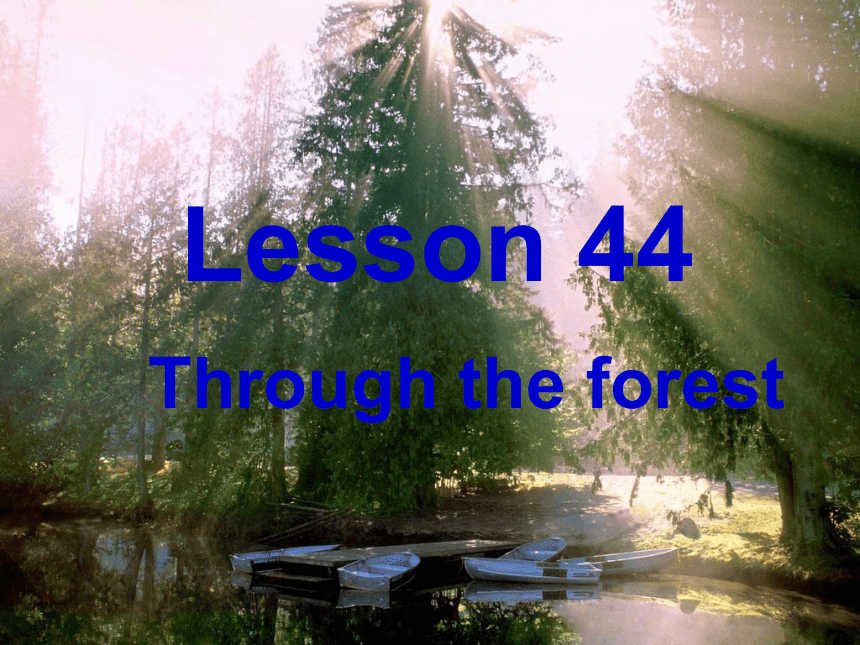
|
|
| 格式 | ppt | ||
| 文件大小 | 1.9MB | ||
| 资源类型 | 教案 | ||
| 版本资源 | 新概念英语 | ||
| 科目 | 英语 | ||
| 更新时间 | 2023-10-06 00:00:00 | ||
图片预览

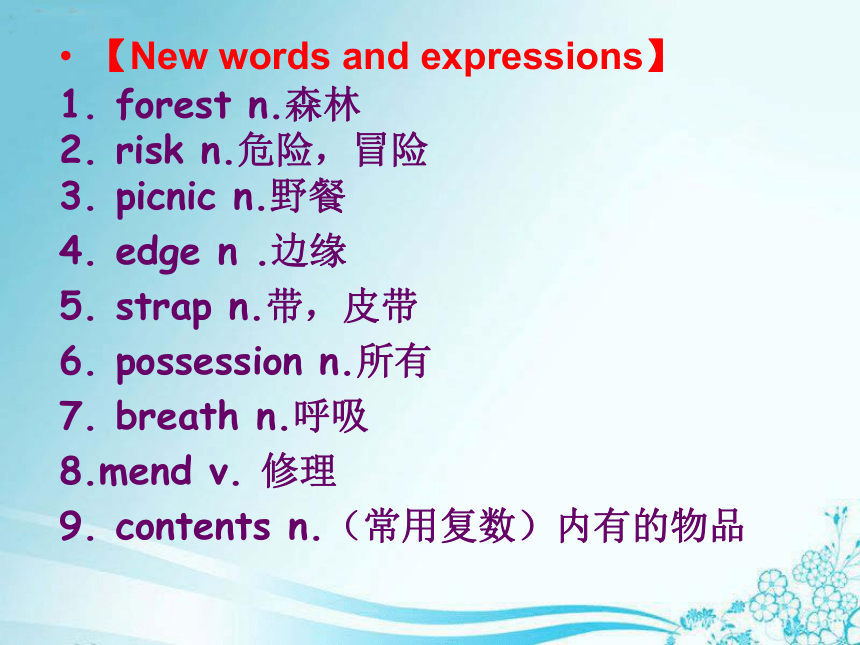
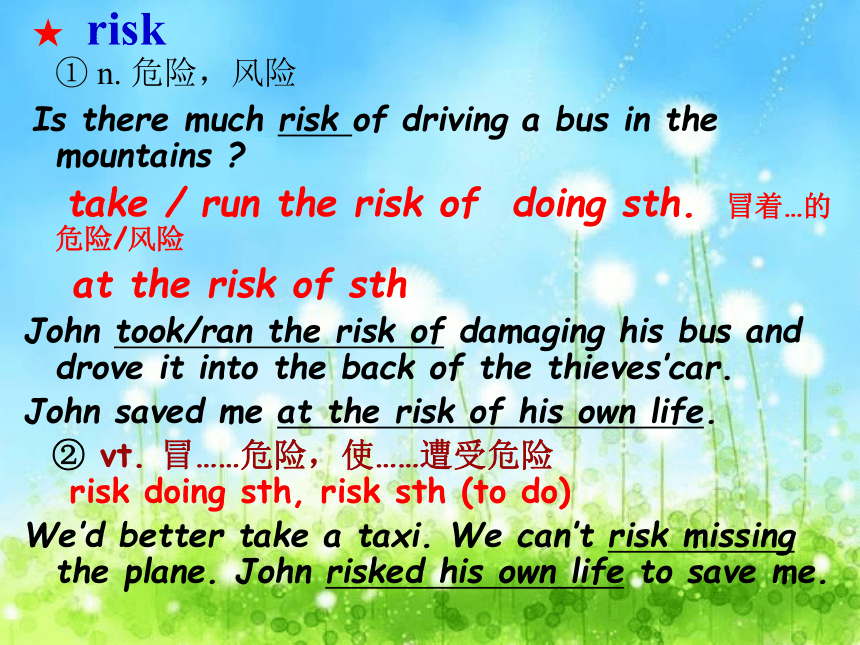
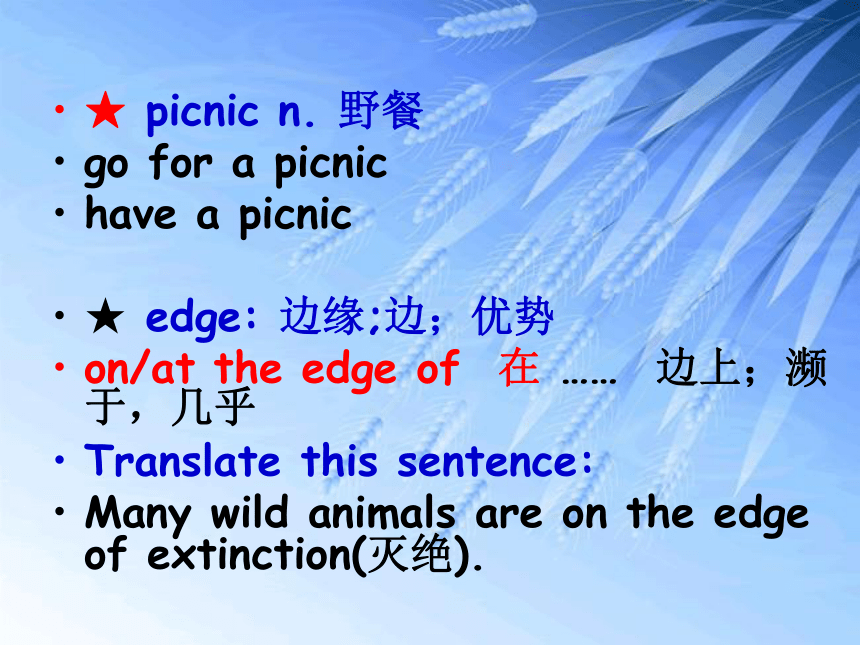
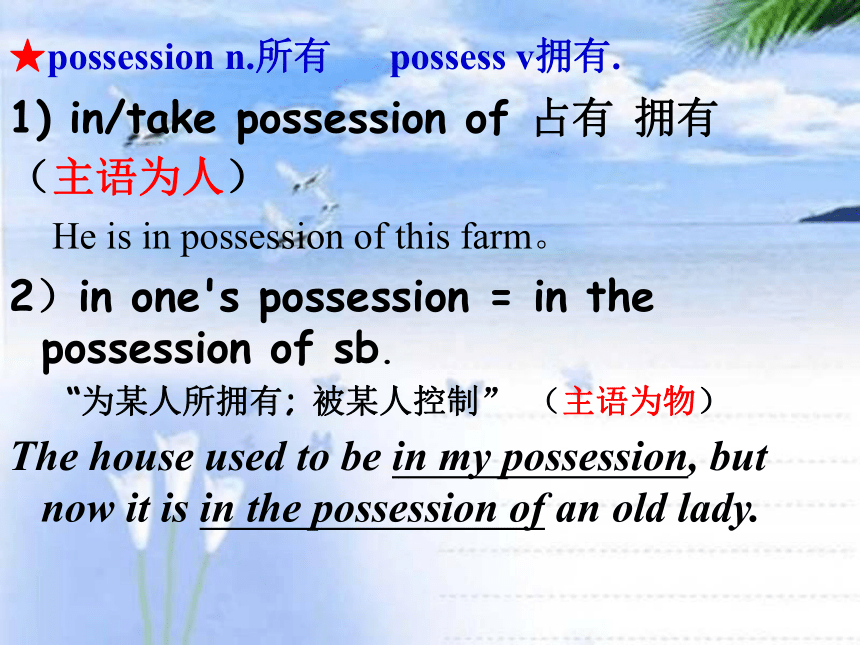
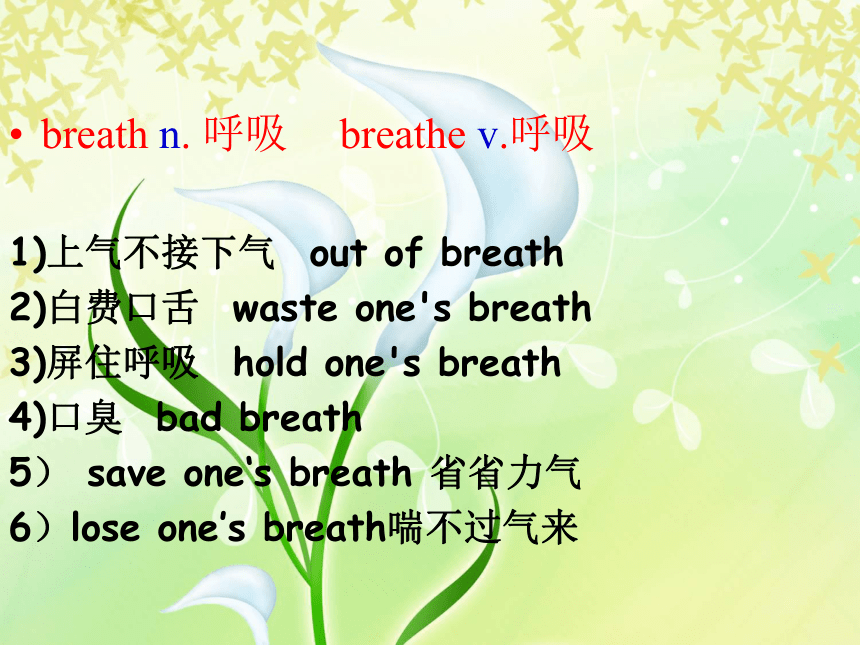
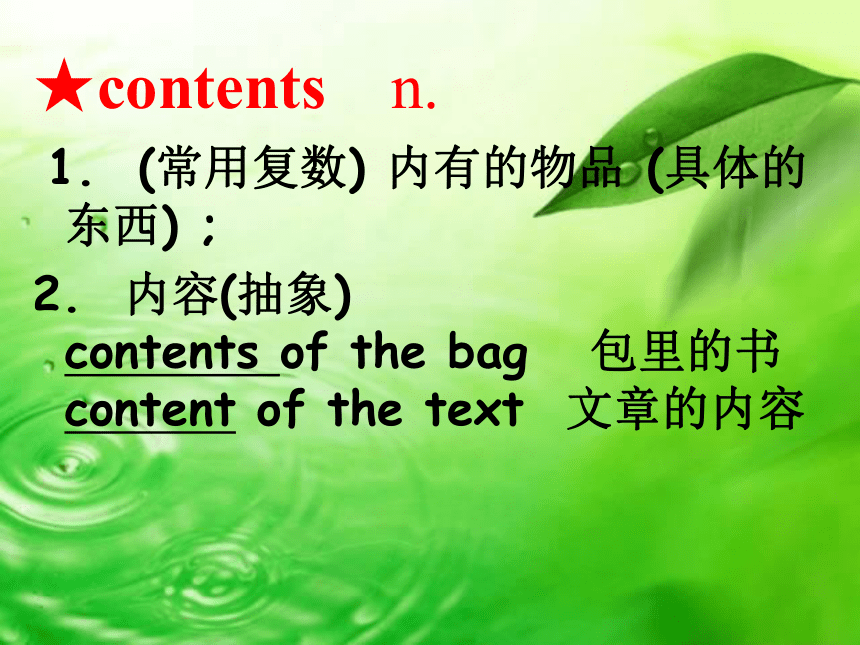
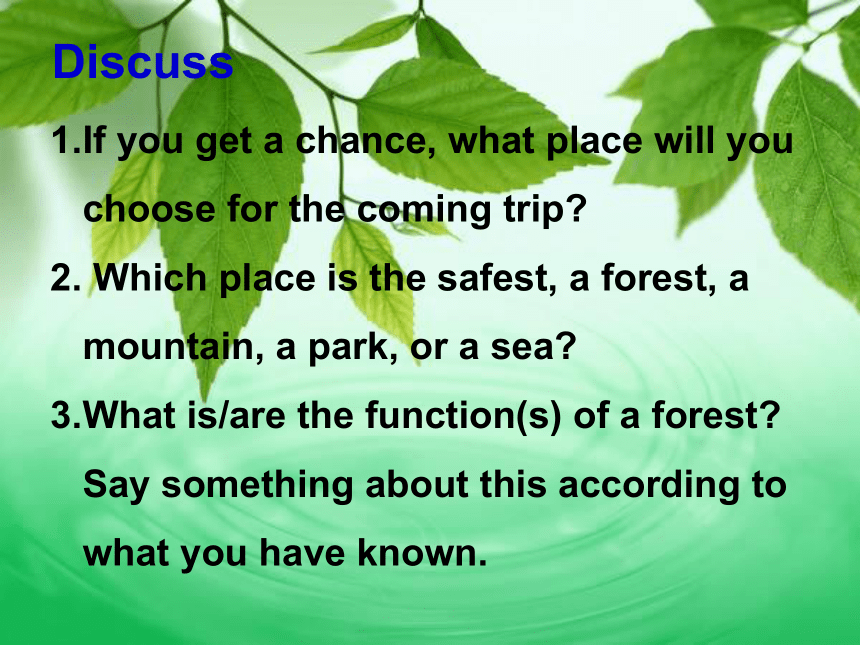
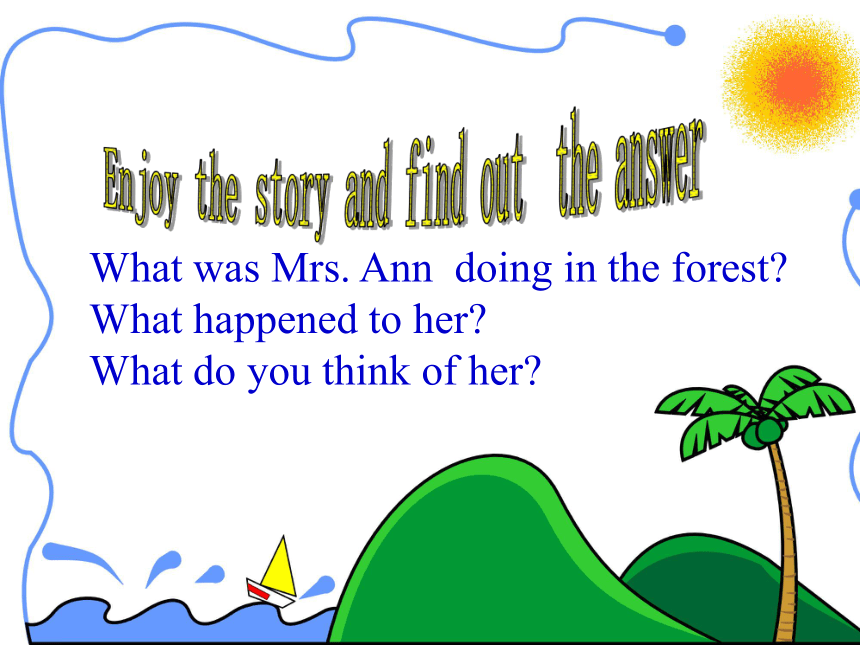
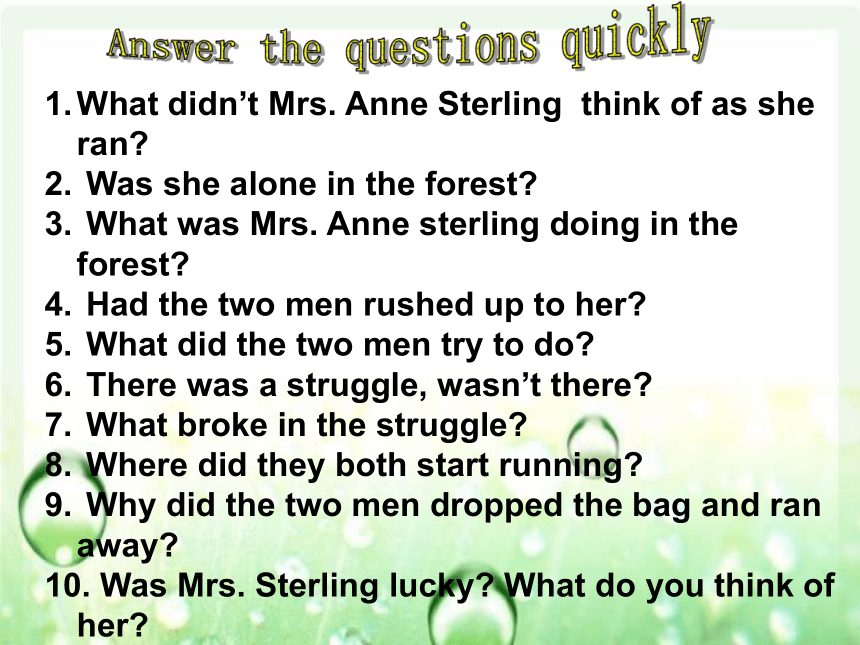
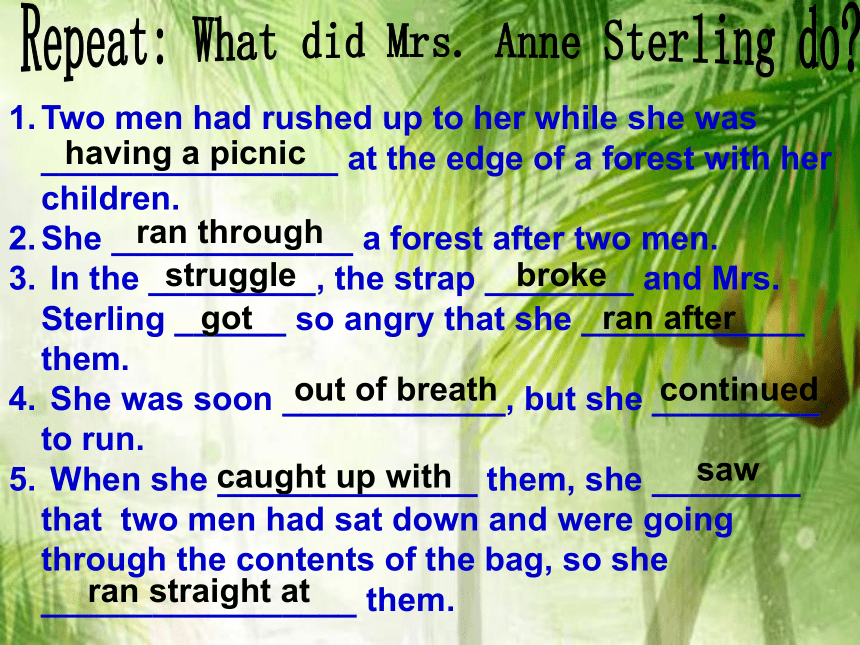
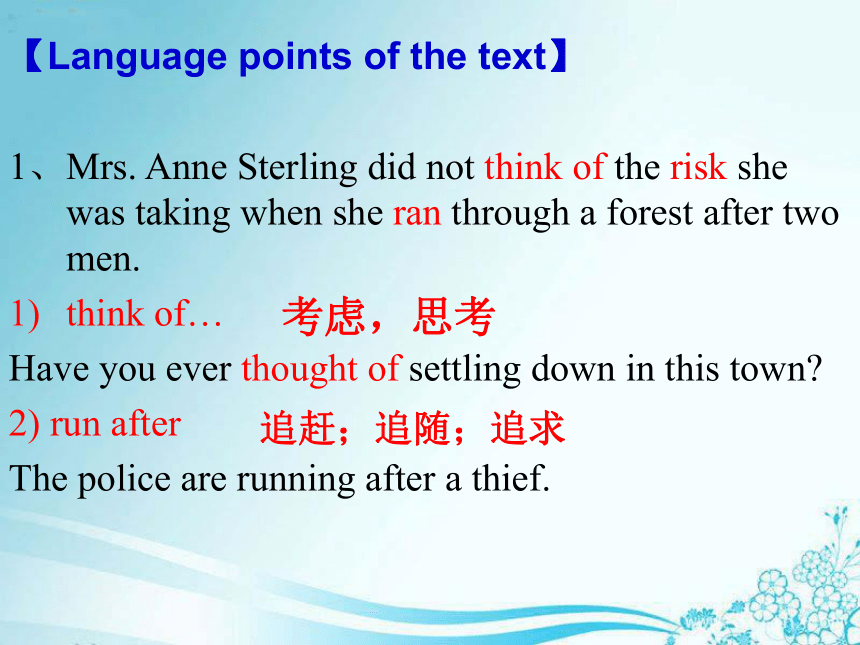
文档简介
(共33张PPT)
Lesson 44
Through the forest
【New words and expressions】
1. forest n.森林
2. risk n.危险,冒险
3. picnic n.野餐
4. edge n .边缘
5. strap n.带,皮带
6. possession n.所有
7. breath n.呼吸
8.mend v. 修理
9. contents n.(常用复数)内有的物品
★ risk ① n. 危险,风险
Is there much risk of driving a bus in the mountains
take / run the risk of doing sth. 冒着…的危险/风险
at the risk of sth
John took/ran the risk of damaging his bus and drove it into the back of the thieves’car.
John saved me at the risk of his own life.
② vt. 冒……危险,使……遭受危险 risk doing sth, risk sth (to do)
We’d better take a taxi. We can’t risk missing the plane. John risked his own life to save me.
★ picnic n. 野餐
go for a picnic
have a picnic
★ edge: 边缘;边;优势
on/at the edge of 在 …… 边上;濒于,几乎
Translate this sentence:
Many wild animals are on the edge of extinction(灭绝).
★possession n.所有 possess v拥有.
1) in/take possession of 占有 拥有
(主语为人)
He is in possession of this farm。
2)in one's possession = in the possession of sb.
“为某人所拥有; 被某人控制” (主语为物)
The house used to be in my possession, but now it is in the possession of an old lady.
breath n. 呼吸 breathe v.呼吸
1)上气不接下气 out of breath
2)白费口舌 waste one's breath
3)屏住呼吸 hold one's breath
4)口臭 bad breath
5) save one‘s breath 省省力气
6)lose one’s breath喘不过气来
★contents n.
1. (常用复数) 内有的物品 (具体的东西) ;
2. 内容(抽象) contents of the bag 包里的书 content of the text 文章的内容
If you get a chance, what place will you choose for the coming trip
Which place is the safest, a forest, a mountain, a park, or a sea
What is/are the function(s) of a forest Say something about this according to what you have known.
Discuss
What was Mrs. Ann doing in the forest
What happened to her
What do you think of her
What didn’t Mrs. Anne Sterling think of as she ran
Was she alone in the forest
What was Mrs. Anne sterling doing in the forest
Had the two men rushed up to her
What did the two men try to do
There was a struggle, wasn’t there
What broke in the struggle
Where did they both start running
Why did the two men dropped the bag and ran away
Was Mrs. Sterling lucky What do you think of her
Two men had rushed up to her while she was ________________ at the edge of a forest with her children.
She _____________ a forest after two men.
In the _________, the strap ________ and Mrs. Sterling ______ so angry that she ____________ them.
She was soon ____________, but she _________ to run.
When she ______________ them, she ________ that two men had sat down and were going through the contents of the bag, so she _________________ them.
having a picnic
ran through
struggle
broke
got
ran after
out of breath
continued
caught up with
saw
ran straight at
【Language points of the text】
1、Mrs. Anne Sterling did not think of the risk she was taking when she ran through a forest after two men.
think of…
Have you ever thought of settling down in this town
2) run after
The police are running after a thief.
考虑,思考
追赶;追随;追求
2、They had rushed up to her while she was having a picnic at the edge of a forest with her children and tried to steal her handbag.
1)rush up to sb.
2)have a picnic
3)at the edge of
4)try to do sth 努力做某事
try doing sth 尝试做某事
try one’s best 尽某人最大努力
迎面冲向某人
举行野餐
在……的边上
3. In the struggle, the strap broke and, with the bag in their possession, both men started running through the trees.
☆in one's possession = in the possession of sb.
“为某人所拥有; 被某人控制”
☆Start doing sth. 开始做某事
4. Mrs. Sterling got so angry that she ran after them.
☆so…that,such…that:so后面是跟形容词和副词;而such后面是跟名词。
such…that…与so…that…都可以用来引导结果状语从句,意为“如此……以致……”。
such…that…的句型结构可分为以下三种:
①such +a(n)(+adj.)+单数可数名词+that从句。
She is such a good teacher that all of us love and respect her.
Table tennis is such an interesting game that people all over the world play it.
②such(+adj.)+复数可数名词+that从句。如:
They are such interesting books that I want to read them once more/again.
③such(adj.)+不可数名词+that从句。如:
It was such bad weather that I had to stay at home.
2)so是副词,与形容词或副词连用,其结构是:so+adj.(adv.)+that从句。
He ran so fast that I couldn’t catch up with him.
I am so sleepy that I can hardly keep my eyes open.
注意
①当名词前面有many,much,few,little等表示数量多少的限定词时,应该用so,而不能用such。
There were so many people in the street watching the fire that firefighters could not get close to the building.
②当单数名词前有形容词时,既可用so,也可用such,但不定冠词的位置却有所不同。
★This is such an important meeting that you should attend it.(=This is so important a meeting that you should attend it.)这是一次很重要的会议,你一定要参加。
5、She was soon out of breath, but she continued to run.
out of breath
Tom ran to the shop to get some salt for his mother. When he reached there, he was quite out of breath.
continued to do sth.=continue doing sth. 接着做……
1)catch up with sb. 追上,赶上(强调结果)
2)go through (仔细地)搜查,在……中搜寻,浏览,翻看(速度较快的看)
She went through her bag, but she couldn’t find her key.
3) run straight at向…直冲过去
6. When she caught up with them, she saw that they had sat down and were going through the contents of the bag, so she ran straight at them.
7. The men got such a fright that they dropped the bag and ran away.
这两个人吓了一跳,result
☆such…that
☆need/want doing sth. 需要被做,后面接的动名词有被动的含义。=need to be done
The car needs washing.
☆mend是表示“修修补补,小修小补”,常用于修补打破、撕破的东西或衣物等。repair也是表示“修理”,不过repair是指修理好损坏的、用旧的东西,或是出故障的机器
Our clavichord is being repaired. 我们家的击弦古钢琴正在修理。
I’ll mend the shirt. 我会补那件衬衫的。
总之,repair比mend正式,表示缝补的时候我们多用mend.
8、'The strap needs mending,' said Mrs. Sterling later, 'but they did not steal anything.'
想起,想到
冒…风险
追赶
举行野餐
在…的边缘
为…所有(主物)
占有(主人)
上气不接下气
think of
take the risk of
run after
have a picnic
at the edge of
in one’s possession
out of breath
赶上,追上
翻看,搜查
包里的东西
向…直冲过去
逃走
需要被做
如此….以致
catch up with
go through
the contents of the bag
run straight at
run away
need doing
such/so that
Summary
____ men tried to _____ Mrs. Ann Sterling’s ___________ while she was ___________ with ____________ .The men took the bag after a __________ and ran ________ the trees. Mrs. Ann Sterling _____________ them and caught ___________ them. The men had sat down and were _______________ the _________ of the bag. Mrs. Sterling ran _________ at them. The men got ______ a fright ______ they dropped the bag and________.
Two
steal
handbag
having a picnic
her children
struggle
through
ran after
up with
going through
contents
straight
such
that
ran away
【Key structures】
动名词
1、动名词可以做主语、宾语、介词宾语等
Washing the car made me tired.(主语)
Before leaving the office, he gave me a book.(宾语)
I am very keen on cycling.(介宾)
2、动名词还可以用于“动词+介词”之后
①to后跟动名词的有(此时to为介词)
look forward to doing sth. 期盼做某事
I am looking forward to seeing him tomorrow.
be accustomed to doing sth. 习惯于做某事
I am accustomed to getting up early.
我习惯早起.
be used to doing sth. 习惯做某事
I am used to getting up early.
我习惯早起.
prefer doing to doing与 …相比更喜欢做… I prefer walking to driving.
devote to doing sth. 奉献给某事,
devote oneself to doing sth. (全身心投入做某事)
My mother devotes herself to doing housework.
object to doing sth. 反对做某事
I object to eating out. 我反对在外面吃饭.
pay attention to doing sth.
②其他介词
get/be tired of doing sth. 对……厌烦, 作为系动词get可与be 替换
believe in 信任,信仰
believe in + sb. 表示信任某人,信仰某人
believe in + doing sth. 信仰...
I belive in taking it easy. (take it easy 轻松,放松,慢慢来)
accuse sb. of doing sth. 因某事控告某人(accuse vt. 控告;指控)
The police accused him of stealing. 警方控告他犯有盗窃罪.
be afraid of /be good at /do well in/等
3、在start,begin,continue等后面,既可以用不定式又可以用动名词,区别不大:
I began to learn/learning English two years ago.
③与表示心理状态的词连用:begin to realize/understand. She began to understand. 她渐渐地明白了。
但在有些情况,通常用to do.如:
①进行时态中:be beginning to do.
The water is beginning to boil.
水开始沸腾起来了。
②物作主语:sth begins/began to do sth.
It begins to rain.
4、在hate、love,like,prefer等动词后,用不定式和动名词意义有所区别。
hate,love,like+doing sth. 表示一种习惯(always)
hate,love,like+to do sth. 表示某一次行为(now)
would love /like to do sth. 表示想要
类似的词还有remember to do /doing
forget to do /doing
regret to do /doing
stop to do /doing
try to do /doing
mean to do /doing
5、在need,want之后,动名词形式具有被动的含义,相当于被动的不定式.
如果以物体做主语,可以直接加动词-ing,表达被动的含义
My shirt is torn. It needs mending. 我的衬衫撕破了, 需要缝补.
Those windows are dirty. They want washing. 那些窗户很脏, 需要洗刷
【Special Difficulties】
catch and run
catch主要意思是“抓住、捉住、逮住”,但有时可以表示“(及时)赶上、追上”等:
He ran quickly to catch the last bus home.
When she caught up with them, she saw that they were going through the contents of the bag.
run的本意是“跑”,后面加上不同的小品词可以表达“追赶,逃跑”等多种含义:
She has run off with all his money.
The man ran away with her bag.
run after
Lesson 44
Through the forest
【New words and expressions】
1. forest n.森林
2. risk n.危险,冒险
3. picnic n.野餐
4. edge n .边缘
5. strap n.带,皮带
6. possession n.所有
7. breath n.呼吸
8.mend v. 修理
9. contents n.(常用复数)内有的物品
★ risk ① n. 危险,风险
Is there much risk of driving a bus in the mountains
take / run the risk of doing sth. 冒着…的危险/风险
at the risk of sth
John took/ran the risk of damaging his bus and drove it into the back of the thieves’car.
John saved me at the risk of his own life.
② vt. 冒……危险,使……遭受危险 risk doing sth, risk sth (to do)
We’d better take a taxi. We can’t risk missing the plane. John risked his own life to save me.
★ picnic n. 野餐
go for a picnic
have a picnic
★ edge: 边缘;边;优势
on/at the edge of 在 …… 边上;濒于,几乎
Translate this sentence:
Many wild animals are on the edge of extinction(灭绝).
★possession n.所有 possess v拥有.
1) in/take possession of 占有 拥有
(主语为人)
He is in possession of this farm。
2)in one's possession = in the possession of sb.
“为某人所拥有; 被某人控制” (主语为物)
The house used to be in my possession, but now it is in the possession of an old lady.
breath n. 呼吸 breathe v.呼吸
1)上气不接下气 out of breath
2)白费口舌 waste one's breath
3)屏住呼吸 hold one's breath
4)口臭 bad breath
5) save one‘s breath 省省力气
6)lose one’s breath喘不过气来
★contents n.
1. (常用复数) 内有的物品 (具体的东西) ;
2. 内容(抽象) contents of the bag 包里的书 content of the text 文章的内容
If you get a chance, what place will you choose for the coming trip
Which place is the safest, a forest, a mountain, a park, or a sea
What is/are the function(s) of a forest Say something about this according to what you have known.
Discuss
What was Mrs. Ann doing in the forest
What happened to her
What do you think of her
What didn’t Mrs. Anne Sterling think of as she ran
Was she alone in the forest
What was Mrs. Anne sterling doing in the forest
Had the two men rushed up to her
What did the two men try to do
There was a struggle, wasn’t there
What broke in the struggle
Where did they both start running
Why did the two men dropped the bag and ran away
Was Mrs. Sterling lucky What do you think of her
Two men had rushed up to her while she was ________________ at the edge of a forest with her children.
She _____________ a forest after two men.
In the _________, the strap ________ and Mrs. Sterling ______ so angry that she ____________ them.
She was soon ____________, but she _________ to run.
When she ______________ them, she ________ that two men had sat down and were going through the contents of the bag, so she _________________ them.
having a picnic
ran through
struggle
broke
got
ran after
out of breath
continued
caught up with
saw
ran straight at
【Language points of the text】
1、Mrs. Anne Sterling did not think of the risk she was taking when she ran through a forest after two men.
think of…
Have you ever thought of settling down in this town
2) run after
The police are running after a thief.
考虑,思考
追赶;追随;追求
2、They had rushed up to her while she was having a picnic at the edge of a forest with her children and tried to steal her handbag.
1)rush up to sb.
2)have a picnic
3)at the edge of
4)try to do sth 努力做某事
try doing sth 尝试做某事
try one’s best 尽某人最大努力
迎面冲向某人
举行野餐
在……的边上
3. In the struggle, the strap broke and, with the bag in their possession, both men started running through the trees.
☆in one's possession = in the possession of sb.
“为某人所拥有; 被某人控制”
☆Start doing sth. 开始做某事
4. Mrs. Sterling got so angry that she ran after them.
☆so…that,such…that:so后面是跟形容词和副词;而such后面是跟名词。
such…that…与so…that…都可以用来引导结果状语从句,意为“如此……以致……”。
such…that…的句型结构可分为以下三种:
①such +a(n)(+adj.)+单数可数名词+that从句。
She is such a good teacher that all of us love and respect her.
Table tennis is such an interesting game that people all over the world play it.
②such(+adj.)+复数可数名词+that从句。如:
They are such interesting books that I want to read them once more/again.
③such(adj.)+不可数名词+that从句。如:
It was such bad weather that I had to stay at home.
2)so是副词,与形容词或副词连用,其结构是:so+adj.(adv.)+that从句。
He ran so fast that I couldn’t catch up with him.
I am so sleepy that I can hardly keep my eyes open.
注意
①当名词前面有many,much,few,little等表示数量多少的限定词时,应该用so,而不能用such。
There were so many people in the street watching the fire that firefighters could not get close to the building.
②当单数名词前有形容词时,既可用so,也可用such,但不定冠词的位置却有所不同。
★This is such an important meeting that you should attend it.(=This is so important a meeting that you should attend it.)这是一次很重要的会议,你一定要参加。
5、She was soon out of breath, but she continued to run.
out of breath
Tom ran to the shop to get some salt for his mother. When he reached there, he was quite out of breath.
continued to do sth.=continue doing sth. 接着做……
1)catch up with sb. 追上,赶上(强调结果)
2)go through (仔细地)搜查,在……中搜寻,浏览,翻看(速度较快的看)
She went through her bag, but she couldn’t find her key.
3) run straight at向…直冲过去
6. When she caught up with them, she saw that they had sat down and were going through the contents of the bag, so she ran straight at them.
7. The men got such a fright that they dropped the bag and ran away.
这两个人吓了一跳,result
☆such…that
☆need/want doing sth. 需要被做,后面接的动名词有被动的含义。=need to be done
The car needs washing.
☆mend是表示“修修补补,小修小补”,常用于修补打破、撕破的东西或衣物等。repair也是表示“修理”,不过repair是指修理好损坏的、用旧的东西,或是出故障的机器
Our clavichord is being repaired. 我们家的击弦古钢琴正在修理。
I’ll mend the shirt. 我会补那件衬衫的。
总之,repair比mend正式,表示缝补的时候我们多用mend.
8、'The strap needs mending,' said Mrs. Sterling later, 'but they did not steal anything.'
想起,想到
冒…风险
追赶
举行野餐
在…的边缘
为…所有(主物)
占有(主人)
上气不接下气
think of
take the risk of
run after
have a picnic
at the edge of
in one’s possession
out of breath
赶上,追上
翻看,搜查
包里的东西
向…直冲过去
逃走
需要被做
如此….以致
catch up with
go through
the contents of the bag
run straight at
run away
need doing
such/so that
Summary
____ men tried to _____ Mrs. Ann Sterling’s ___________ while she was ___________ with ____________ .The men took the bag after a __________ and ran ________ the trees. Mrs. Ann Sterling _____________ them and caught ___________ them. The men had sat down and were _______________ the _________ of the bag. Mrs. Sterling ran _________ at them. The men got ______ a fright ______ they dropped the bag and________.
Two
steal
handbag
having a picnic
her children
struggle
through
ran after
up with
going through
contents
straight
such
that
ran away
【Key structures】
动名词
1、动名词可以做主语、宾语、介词宾语等
Washing the car made me tired.(主语)
Before leaving the office, he gave me a book.(宾语)
I am very keen on cycling.(介宾)
2、动名词还可以用于“动词+介词”之后
①to后跟动名词的有(此时to为介词)
look forward to doing sth. 期盼做某事
I am looking forward to seeing him tomorrow.
be accustomed to doing sth. 习惯于做某事
I am accustomed to getting up early.
我习惯早起.
be used to doing sth. 习惯做某事
I am used to getting up early.
我习惯早起.
prefer doing to doing与 …相比更喜欢做… I prefer walking to driving.
devote to doing sth. 奉献给某事,
devote oneself to doing sth. (全身心投入做某事)
My mother devotes herself to doing housework.
object to doing sth. 反对做某事
I object to eating out. 我反对在外面吃饭.
pay attention to doing sth.
②其他介词
get/be tired of doing sth. 对……厌烦, 作为系动词get可与be 替换
believe in 信任,信仰
believe in + sb. 表示信任某人,信仰某人
believe in + doing sth. 信仰...
I belive in taking it easy. (take it easy 轻松,放松,慢慢来)
accuse sb. of doing sth. 因某事控告某人(accuse vt. 控告;指控)
The police accused him of stealing. 警方控告他犯有盗窃罪.
be afraid of /be good at /do well in/等
3、在start,begin,continue等后面,既可以用不定式又可以用动名词,区别不大:
I began to learn/learning English two years ago.
③与表示心理状态的词连用:begin to realize/understand. She began to understand. 她渐渐地明白了。
但在有些情况,通常用to do.如:
①进行时态中:be beginning to do.
The water is beginning to boil.
水开始沸腾起来了。
②物作主语:sth begins/began to do sth.
It begins to rain.
4、在hate、love,like,prefer等动词后,用不定式和动名词意义有所区别。
hate,love,like+doing sth. 表示一种习惯(always)
hate,love,like+to do sth. 表示某一次行为(now)
would love /like to do sth. 表示想要
类似的词还有remember to do /doing
forget to do /doing
regret to do /doing
stop to do /doing
try to do /doing
mean to do /doing
5、在need,want之后,动名词形式具有被动的含义,相当于被动的不定式.
如果以物体做主语,可以直接加动词-ing,表达被动的含义
My shirt is torn. It needs mending. 我的衬衫撕破了, 需要缝补.
Those windows are dirty. They want washing. 那些窗户很脏, 需要洗刷
【Special Difficulties】
catch and run
catch主要意思是“抓住、捉住、逮住”,但有时可以表示“(及时)赶上、追上”等:
He ran quickly to catch the last bus home.
When she caught up with them, she saw that they were going through the contents of the bag.
run的本意是“跑”,后面加上不同的小品词可以表达“追赶,逃跑”等多种含义:
She has run off with all his money.
The man ran away with her bag.
run after
同课章节目录
